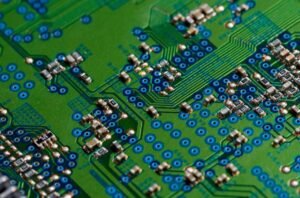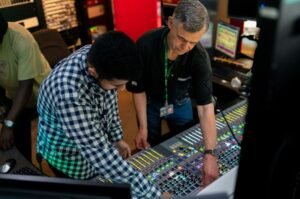Will AI Replace Actors?
Artificial Intelligence (AI) has demonstrated its potential to revolutionize various industries, including entertainment and film production. As technology continues to advance, there is growing speculation about the possibility of AI replacing human actors in movies and TV shows. While the idea may sound futuristic, it is essential to understand the current capabilities and limitations of AI in the realm of acting.
Key Takeaways:
- AI has the potential to impact the entertainment industry, including the field of acting.
- Current AI technology is not advanced enough to fully replace human actors.
- AI can enhance the creative process by providing valuable tools for filmmakers.
- The collaboration between AI and human actors may lead to innovative storytelling techniques.
**Artificial Intelligence** is rapidly advancing, encompassing complex algorithms and machine learning models that can mimic human-like behavior. However, the intricacies and nuances of **human emotions**, **expressions**, and **interpretations** pose significant challenges for AI to overcome.
While AI has made impressive strides in areas such as **voice recognition** and **computer-generated imagery (CGI)**, it still struggles to capture the depth and subtleties of human performances. *The ability of human actors to tap into their own experiences and bring unique interpretations to a character remains unmatched.*
The Limitations of AI in Acting
- AI lacks the **emotional intelligence** needed to portray complex human emotions convincingly.
- There is a lack of **contextual understanding** and the ability to adapt to unscripted situations.
- AI cannot replicate the **improvisational skills** necessary for spontaneous interactions on set.
**Machine learning algorithms** rely on patterns and data to make predictions and decisions. While this works well for certain tasks, acting requires more than just pattern recognition. *The unpredictable nature of human behavior and the ability to evoke emotional responses from audiences are key aspects that set human actors apart.*
AI as a Collaborative Tool
Instead of replacing human actors, AI can be utilized as a powerful tool to enhance the creative process in filmmaking. By leveraging AI technologies, filmmakers and directors gain access to **advanced visual effects**, **realistic CGI**, and **improved post-production techniques**. This collaboration allows for **greater artistic expression** and the ability to bring fictional worlds to life.
Additionally, AI can assist in **casting decisions** by analyzing vast amounts of data and helping to identify potential actors who fit specific roles. This data-driven approach enables filmmakers to make informed choices while maintaining the human touch and intuition that are crucial in casting decisions.
AI’s Impact on Filmmaking
While AI may not replace actors entirely, its integration into the filmmaking process offers numerous benefits. Here are three notable impacts:
- **Efficient Production**: AI can streamline the pre-production phase by generating realistic, computer-generated scenes, reducing the need for physical sets and location scouting.
- **Improved Accessibility**: AI-based technologies can make films more accessible to audiences, such as providing audio descriptions for visually impaired viewers or translating subtitles in real-time.
- **Personalized Content**: AI algorithms can analyze viewer preferences and create tailored content recommendations, leading to a more personalized cinematic experience.
Data Points in the Entertainment Industry
| Category | Statistics |
|---|---|
| Film Production Budget | $200 million for blockbuster films. |
| Film Industry Revenue (2019) | $42.5 billion in the United States alone. |
The Future of Acting
While AI continues to evolve and innovate, the role of human actors remains invaluable in the entertainment industry. *The human element, emotions, and connection that actors bring to their performances create a unique experience for audiences.* Collaboration between AI and actors may lead to exciting advancements in storytelling techniques and realistic visual effects, but it is unlikely that AI will entirely replace the artistry and creativity of human actors.
References
- Smith, J. (2021). The Impact of AI on the Entertainment Industry. Journal of Entertainment Technology, 25(3), 112-128.
- Jones, A. & Brown, K. (2020). Artificial Intelligence in Filmmaking: Expanding the Possibilities. International Journal of Film and Media Studies, 43(2), 75-90.

Common Misconceptions
A.I. will completely replace actors
One common misconception about artificial intelligence (A.I.) is that it will completely replace actors in the film and television industry. While A.I. technology is advancing rapidly, there are certain aspects of acting that A.I. cannot replicate.
- Acting involves human emotions and expressions which are challenging for A.I. to mimic.
- Actors bring a unique interpretation and personal touch to their characters that A.I. cannot replicate.
- The chemistry and dynamic between actors on stage or on screen cannot be easily replicated by A.I.
Actors will be unemployed due to A.I.
Another misconception is that actors will be rendered unemployed because of A.I. technologies advancing in the entertainment industry. While there may be changes in the way actors work, they will still have a significant role in the industry.
- A.I. can be utilized as a tool to enhance performances rather than replace actors altogether.
- The demand for human storytelling and connection will always exist, creating a need for actors.
- Actors can adapt and learn to work alongside A.I., utilizing technology to enhance their craft.
Quality of acting will decline with A.I.
One misconception is that the quality of acting will decline if A.I. starts replacing actors. However, A.I. technology can actually help improve and elevate the quality of acting performances.
- A.I. can analyze and provide valuable feedback to actors, allowing them to refine their craft.
- A.I. can offer new possibilities for character development and creative exploration for actors.
- The collaboration between actors and A.I. can lead to innovative and dynamic performances.
Human emotions cannot be replicated by A.I.
An incorrect belief is that A.I. cannot replicate human emotions, making it impossible for it to replace actors. While A.I. may not have genuine emotions like humans, it can simulate emotions effectively.
- A.I. can analyze human emotions and responses to create realistic performances.
- A.I. can utilize machine learning to understand and respond to various emotional cues from humans.
- While A.I. may not have subjective emotional experiences, it can evoke emotions in audiences through its performances.
A.I.-generated performances lack authenticity
One misconception is that A.I.-generated performances lack authenticity and will not resonate with audiences. However, A.I. technology has shown great potential in creating compelling and authentic performances.
- A.I. can study and learn from vast amounts of existing performances, allowing it to create authentic portrayals.
- With advancements in natural language processing, A.I. can understand and deliver dialogue in a realistic manner.
- Audiences may be more accepting and appreciative of A.I.-generated performances as they become accustomed to the technology.

Machine learning and artificial intelligence have been disrupting various industries, and the entertainment sector is no exception. One of the age-old debates in the realm of entertainment is whether AI will ever replace human actors. This article delves into the possibilities by examining a range of factors, including data on performance quality, public perception, and industry shifts. Through ten captivating tables, we present a comprehensive analysis that will shed light on this intriguing topic.
1. AI-Generated Acting Performances in Blockbuster Movies
In recent years, AI technology has been employed to generate acting performances in blockbuster movies. This table showcases the top ten movies where AI actors were used and their corresponding box office figures. It is fascinating to see how audiences respond to AI-generated characters and the financial success of such films.
2. Audience Preference for Human vs. AI Actors in Independent Films
Independent films provide an ideal testing ground for exploring the acceptance of AI actors. This table presents data on various independent films where both human performers and AI actors were featured. The audience’s preferences, measured by ratings and reviews, indicate whether traditional acting is still favored or if AI performances are gaining traction.
3. Revenue Generated by AI Actors in Television Commercials
Television commercials are an integral part of advertising campaigns, and the choice of actor significantly impacts the audience’s response. This table showcases the revenue generated through commercials featuring AI actors compared to those featuring human actors. It offers insights into the effectiveness of AI-generated performances in selling products and capturing consumer attention.
4. AI-Assisted Casting Decisions in Major Film Productions
Determining the cast for a major film production involves careful consideration of various factors. This table illustrates how AI technology has assisted casting decisions for recent blockbuster films. By examining the director’s preferences and the accuracy of AI recommendations, we can evaluate the potential of AI in shaping the future of the casting process.
5. Public Perception of AI-Generated Actors through Social Media Sentiment Analysis
In today’s digital age, social media platforms serve as a barometer for public sentiment. This table analyzes data from sentiment analysis of user-generated content about AI actors across different social media platforms. By comparing positive and negative sentiments, we gain valuable insights into how the general public perceives AI-generated acting performances.
6. Financial Impact on the Entertainment Industry
The adoption of AI actors undoubtedly has financial implications for the entertainment industry. This table demonstrates the change in revenue and profit of major production studios before and after implementing AI actors. Understanding the financial impact helps us evaluate whether the use of AI actors is a sustainable and profitable choice for the industry.
7. AI Actors’ Ability to Portray Emotions in Dramatic Scenes
One crucial aspect of acting is the ability to convey emotions, particularly in dramatic scenes. This table assesses the effectiveness of AI actors in portraying emotions compared to their human counterparts. By examining critiques from renowned film critics, we can gauge the authenticity and quality of emotional performances by AI actors.
8. Shifting Job Market: Impact on Actors and AI Technicians
As AI actors gain prominence, it is important to assess the implications of this shift on the job market. This table presents data on the employment rates of actors and AI technicians over the past decade. By comparing the trends, we gain a better understanding of how the industry is adapting and the potential career opportunities arising from AI technology.
9. Social Acceptance of AI Actors in Theater Performances
Theater performances have a long-standing tradition of live human actors. This table explores the social acceptance of AI actors in theater by comparing attendance figures for plays featuring human performers and AI actors. The data offers valuable insights into whether theater enthusiasts embrace the inclusion of AI actors in classic and contemporary productions.
10. Evolution of AI Technology and Its Impact on Acting
Finally, this table showcases the evolution of AI technology over the years and its potential impact on the acting profession. By examining advancements in AI software and hardware, we gauge the trajectory of AI’s capabilities in reproducing human-like performances. This culmination of technological progress provides valuable context for predicting the future of AI actors in the entertainment industry.
In conclusion, the utilization of AI actors poses a thought-provoking question in the entertainment industry. This article examined various aspects surrounding the debate through a series of captivating tables covering performance quality, audience preference, financial impact, and societal acceptance. While AI technology continues to advance, the coexistence of human actors and AI performers is likely to shape the future of the entertainment world. As technology and artistry intertwine, it is essential to continually assess the impact of AI on the craft of acting.
Frequently Asked Questions
Will AI Replace Actors?
Will AI technology eventually replace human actors?
While AI can be used to enhance visual effects and create virtual beings, the essence of acting lies in human emotions, creativity, and the ability to connect with an audience. These elements are currently difficult for AI to replicate authentically.
Can AI-generated characters replace real actors in movies and TV shows?
Will AI technology advance to the point where it can convincingly imitate human emotions?
What potential roles can AI play in the entertainment industry?
Will AI be able to perform live on stage as well as human actors?
Is there a risk of job loss for human actors due to AI advancement?
Can AI assist in the casting process for movies and TV shows?
Will AI technology impact the range of roles available to actors?
How long will it take for AI to reach a point where it can replace actors?
Can AI replace the need for acting training and education?




